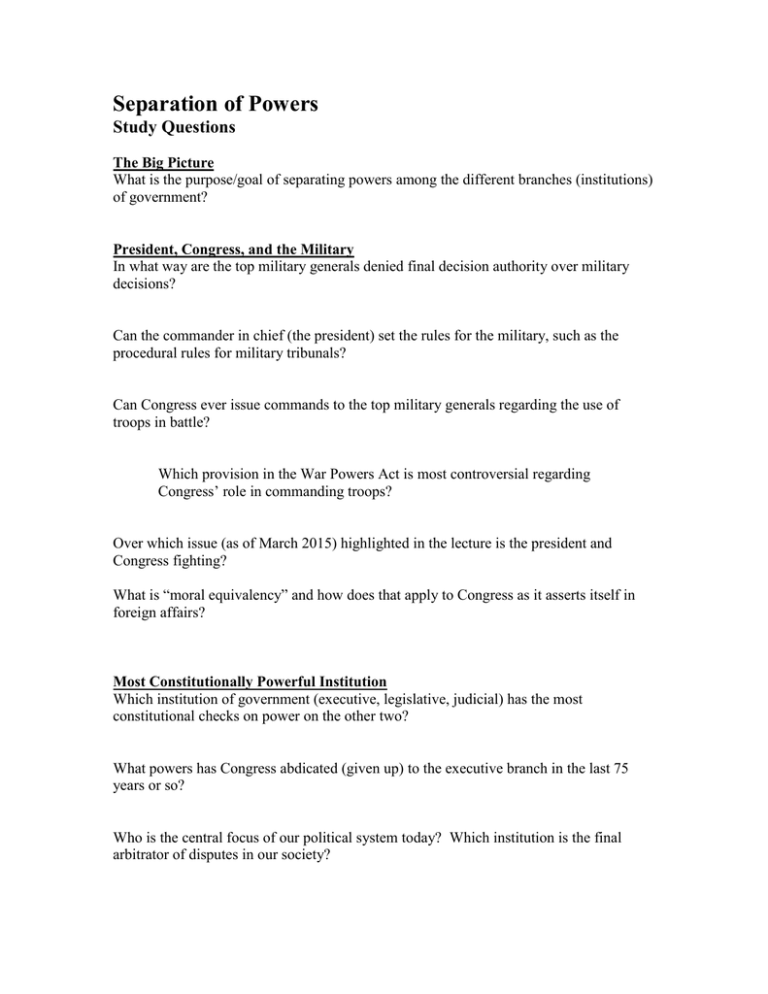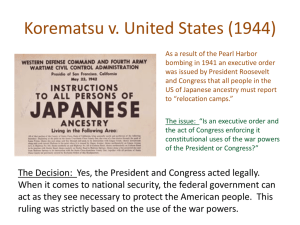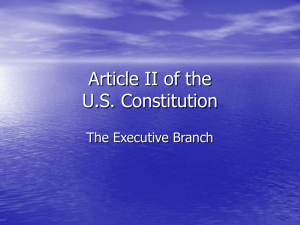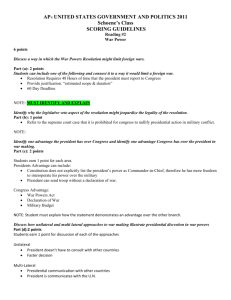Study Questions -- Separation of Powers.doc
advertisement

Separation of Powers Study Questions The Big Picture What is the purpose/goal of separating powers among the different branches (institutions) of government? President, Congress, and the Military In what way are the top military generals denied final decision authority over military decisions? Can the commander in chief (the president) set the rules for the military, such as the procedural rules for military tribunals? Can Congress ever issue commands to the top military generals regarding the use of troops in battle? Which provision in the War Powers Act is most controversial regarding Congress’ role in commanding troops? Over which issue (as of March 2015) highlighted in the lecture is the president and Congress fighting? What is “moral equivalency” and how does that apply to Congress as it asserts itself in foreign affairs? Most Constitutionally Powerful Institution Which institution of government (executive, legislative, judicial) has the most constitutional checks on power on the other two? What powers has Congress abdicated (given up) to the executive branch in the last 75 years or so? Who is the central focus of our political system today? Which institution is the final arbitrator of disputes in our society? Separation of Powers and the Legislative Process What is the president’s role in the legislative process? Congress’ role? The US Supreme Court’s role? The Bureaucracy Give two examples of organizations in the federal bureaucracy? What or who exerts influence over portions of the federal bureaucracy that is not officially part of the federal government? Court-Packing Plan What was FDR’s dispute with the US Supreme Court about? What was FDR’s dispute with the US Senate (Congress) about? Why was this particular dispute a case of institutional conflict (rather than partisan or ideological conflict)? Why did FDR ask Congress for action when his principle dispute was with the US Supreme Court? Impeachment of Andrew Johnson In what way would the Command of Army Act (1867) be a violation of separation of powers? What was the larger policy goal over which President Johnson and Congress were fighting? Who won in this struggle over power? The League of Nations What was the larger policy goal over which President Wilson and the Senate were fighting? Who won in this struggle over policy? Detaining Terror Suspects in the Post-9/11 Era Given the decisions of the Supreme Court, does a terror suspect have a right to appeal to a judge for his release? Does a terror suspect have a right to legal council? Was the dispute between Bush and the US Supreme Court partisan, ideological, institutional or a combination of two or more? Continued Operation of the Guantanamo Bay Detention Facility How did Congress block the Obama administration’s desire to close the Guantanamo Bay detention facility? Was the dispute between President Obama and Congress over whether or not to close Guantanamo Bay partisan? Ideological? Institutional? Implied Check on the US Supreme Court As exhibited in 1937 and in 2012, what role does the Court define for itself when evaluating legislation that is part of a tide of history, such as the implementing the New Deal in the 1930s and staying on path toward universal health care in 2012? Why does the Court fear opposing the elected branches of government when they appear to have the tide of history on their side? The Bottom Line When separation of powers works as it was designed, is the conflict between or among institutions partisan, ideological, or institutional? Would our founding fathers be pleased about how well their separation-of-powers design works? In other words, does the design work as it was originally intended? Boehner v. Obama In July 2014, over which issue did the U.S. House of Representatives sue President Obama in a federal court? What does this issue have to do with separation of powers?







